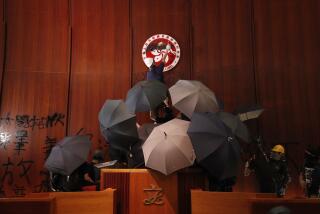Hong Kong ousts four pro-democracy lawmakers as Beijing supporters gain influence
A Hong Kong court on Thursday ousted four pro-democracy lawmakers for taking their oaths incorrectly, stunning the gathered crowd into silence and raising concerns that the city’s legislature would disintegrate into a rubber stamp parliament for Beijing.
This decision robs pro-democracy lawmakers of their veto power in the city’s lawmaking body, handing pro-establishment legislators greater leeway to pass controversial government policies.
The four were disqualified for altering their oaths as they were sworn in, an act viewed as a denouncement of Beijing’s rule. They did not express the “solemnity,” “sincerity” or “exact form and content” requirements set forth by Beijing last year, said judge Thomas Au.
Hong Kong’s youngest lawmaker, Nathan Law, veteran legislator and activist Leung Kwok-hung, professor Edward Yiu and social science lecturer Lau Siu-lai all lost their seats on the Legislative Council, the city’s government watchdog and law-making body.
The verdict follows the ouster last year of two young lawmakers for using an anti-China slur while taking their oaths, in an unprecedented interpretation of Hong Kong laws by China’s parliament.
Joshua Wong, general secretary of the Demosisto political party to which Law belongs, called the verdict “manifest interference” by Beijing “to cripple Hong Kong’s legislative power.”
This will likely do little to calm jitters in a city that fears the mainland is chipping away at its core freedoms, despite promises the country made 20 years ago when it retook the former British colony. China agreed to a framework known as “one country, two systems,” which allowed the territory to maintain its uncensored media and independent courts — rights not enjoyed on the mainland.
The lawmakers’ violations were tweaks to well-known script: Law added a quote from Gandhi. Yiu included a sentence saying he will “uphold procedural justice in Hong Kong, fight for genuine universal suffrage and serve the city’s sustainable development.” Leung held a yellow umbrella, a symbol of massive 2014 pro-democracy protests. Lau took six-second gaps between every word.
While Beijing supporters technically gain more control, analysts wonder how much they will use.
“I’m not sure they will exploit this,” said Stephan Ortmann, assistant professor of political economy at the City University of Hong Kong. “They are also worried about mass protests coming back.
Many Hong Kong citizens remain on edge after Chinese President Xi Jinping issued his sternest warning about challenges to China’s rule.
“Any attempt to endanger China’s sovereignty and security, challenge the power of the Central Government… or use Hong Kong to carry out infiltration and sabotage activities against the mainland is an act that crosses the red line and is absolutely impermissible,” said Xi, who made his first trip as president to Hong Kong this month, where he inaugurated the city’s new leader, led a military parade and commemorated the 20-year anniversary of Chinese rule.
Xi also rallied behind patriotic education and the revival of a national security law, which more than a half million people blocked in 2003 by taking to the streets. The administration is expected to try to pass it. Opponents argue the central government will use the law as a tool for political persecution and curbs on free speech.
Only a small fraction of the city desires full independence, although some believe Beijing further stokes concerns with its harsh language and tighter controls.
“It’s wrong to assume that young people hate China, because they don’t understand China,” said Alvin Hung a 27-year-old lawyer, at a recent rally calling for full democracy in Hong Kong.
“It’s because we know it all too well. There’s a saying: Familiarity breeds contempt.”
Choi is a special correspondent.
More to Read
Start your day right
Sign up for Essential California for news, features and recommendations from the L.A. Times and beyond in your inbox six days a week.
You may occasionally receive promotional content from the Los Angeles Times.






